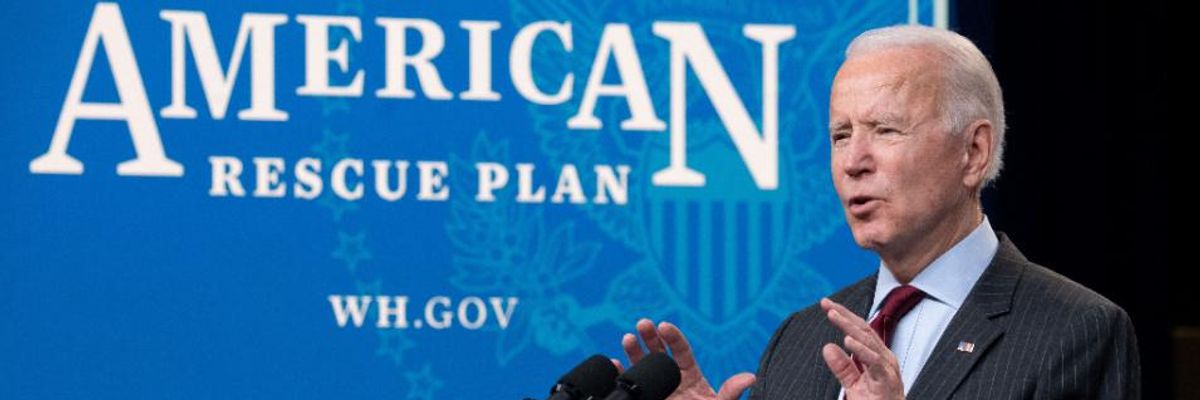The editorial board of Harvard University's daily student newspaper on Tuesday pushed back against President Joe Biden's misleading claim that Ivy League graduates would be the primary beneficiaries of bold debt cancellation and urged the president to support forgiveness beyond the $10,000 he has vowed to pursue.
In an editorial published late Tuesday, The Harvard Crimson rejected as "misguided" Biden's recent attempt to justify his opposition to cancelling $50,000 in student loan debt by claiming the move would forgive "billions of dollars of debt for people who have gone to Harvard and Yale and Penn."
"He should not use the Ivy League and its handful of debt-accruing graduates as an excuse to water down his policies."
--The Harvard Crimson Editorial Board
The student paper responded to the president's assertion by pointing to U.S. Department of Education data showing that "only three percent of undergraduates at Harvard receive federal loans."
"Better yet, according to high education expert Mark Kantrowitz, only 0.3 percent of federal student borrowers attended Ivy League colleges," the editorial states. "It's not our student debt--but we still want Biden to forgive it... He should not use the Ivy League and its handful of debt-accruing graduates as an excuse to water down his policies."
"We often see the Ivy League used as a political tool, usually in incorrect or misleading ways, to rally against progressive policies," the editorial continued. "Biden's embrace of this trend is deeply disappointing. After all, he stuffed his Cabinet posts with affiliates of our institution."
During a CNN town hall last Tuesday, Biden said he "will not" cancel $50,000 in student loan debt per borrower via executive order, a proposal pushed by congressional Democrats and supported by a majority of the U.S. electorate. Instead, the president said he is "prepared to write off" $10,000 in student debt per borrower, but did not say whether he would try to do so through executive action or legislation.
The Crimson editorial board, composed of dozens of current Harvard students, called Biden's $10,000 figure a "self-imposed" limit that the president "should not feel beholden to."
"The Biden administration ought to agree to a generous student loan forgiveness program beyond any arbitrary boundaries," the editorial declares.
According to Kantrowitz, the $50,000 debt cancellation plan introduced earlier this month by Sen. Elizabeth Warren (D-Mass.) and Senate Majority Leader Chuck Schumer (D-N.Y.) would forgive all of the student loan debt for 80% of federal borrowers--some 36 million people.
"All Ivy League degrees are not equal, but debt cancellation can be. Cancel up to $50,000 of student debt, Mr. President."
--Brown University graduate Rakim Brooks
Moreover, a study published last week by the Jain Family Institute showed that "because low- and lower-middle income communities see the worst debt-to-income ratios, they would see the largest portion of their income freed up through student debt forgiveness"--a finding that runs counter to Biden's suggestion that the beneficiaries of cancellation would be elites who don't need the help.
In an op-ed for Fortune on Tuesday, ACLU campaign strategist Rakim Brooks echoed the Crimson editorial board's rejection of Biden's case against more sweeping student debt cancellation, arguing that "where someone went to school is irrelevant to the debate."
"I know. As a Black, first-generation college graduate who attended Brown University, I have lived a very different existence than Biden might assume, including carrying the intense burdens of student debt," wrote Brooks. "As the first person in my immediate family to attend college, I was stunned and elated. I had a shot to attend an Ivy League school that few from East Harlem's Wagner Houses, a public housing development, had probably ever been given--and that shot came at a steep price: $32,000 total."
"Cancelling student debt is a critical step to closing the racial wealth gap, providing the financial stability that would allow all young Americans to save for a home, start a business, and invest," Brooks argued. "It would also serve as an additional economic stimulus at a time when the American economy so desperately needs it. All Ivy League degrees are not equal, but debt cancellation can be. Cancel up to $50,000 of student debt, Mr. President."

